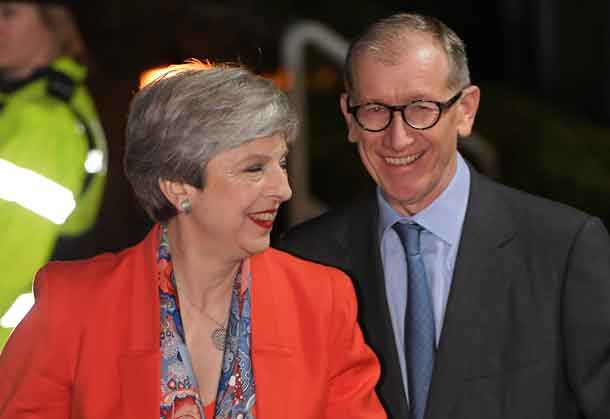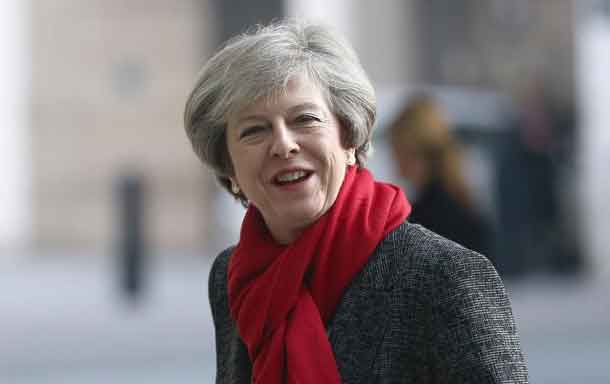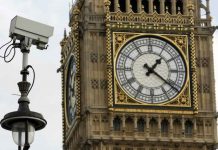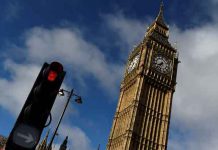

By Alistair Smout and David Milliken
LONDON (Reuters) – British voters punished Theresa May for her electoral gamble by denying her the resounding mandate she wanted to strengthen her hand in Brexit talks, casting doubt over her premiership and raising the prospect of a deadlocked parliament.
An exit poll predicted the Conservatives would win 314 seats in Britain’s 650-member parliament and the left-wing opposition Labour Party 266 — a “hung parliament” with no clear winner.
May unexpectedly called the snap election seven weeks ago to increase the slim majority she had inherited from predecessor David Cameron before launching into arduous divorce talks with the European Union, set to start in just over a week.
Instead, if the exit poll showing strong gains for Jeremy Corbyn’s Labour is anywhere near accurate, she risks losing power in what would be an ignominious end to her 11 months at Number 10 Downing Street.
May had spent the campaign denouncing Corbyn as the weak leader of a spendthrift party that would crash Britain’s economy and flounder in Brexit talks, while she would provide “strong and stable leadership” to clinch a good deal for Britain.
But her campaign unravelled after a major policy u-turn on care for the elderly, while Corbyn’s old-school socialist platform and more impassioned campaigning style won wider support than anyone had foreseen.
“We still don’t know the final result of this election, it is too early to say, but it looks likely to be a very, very bad result for Theresa May,” said Labour’s Deputy Leader Tom Watson in a statement after holding his own seat.
Sterling fell by more than two cents against the U.S. dollar.
“A hung parliament is the worst outcome from a markets perspective as it creates another layer of uncertainty ahead of the Brexit negotiations and chips away at what is already a short timeline to secure a deal for Britain,” said Craig Erlam, an analyst with brokerage Oanda in London.
BREXIT QUESTIONS
With the smaller parties more closely aligned with Labour than with the Conservatives, the prospect of Corbyn becoming prime minister no longer seems fanciful.
That would make the course of Brexit even harder to predict. During his three decades on Labour’s leftist fringe, Corbyn consistently opposed European integration and denounced the EU as a corporate, capitalist body.
As party leader, he unenthusiastically campaigned for Britain to remain in the bloc. How he would steer Britain through Brexit negotiations has not been explained in detail.
Early results were in line with the exit poll, with Labour doing better than expected. That was in part because votes that had previously gone to the anti-EU UKIP party were splitting evenly between the two major parties instead of going overwhelmingly to the Conservatives as pundits had expected.
The Conservatives failed to win the constituency of Darlington in northern England, a key target. In Wales, the closely-fought Vale of Clwyd seat was the first to switch from the Conservatives to Labour.
One of May’s top ministers, Home Secretary Amber Rudd, faced a recount in her south coast constituency, an indication that the result there was very close.
In Battersea, a London constituency, a Conservative junior finance minister lost her seat to Labour.
Even if the exit poll has underestimated the number of Conservative seats, as it did in 2015, and the party ends up with a slim majority, May will be so weakened that she may not be able to keep her job.
When she called the election, she was enjoying opinion poll leads of 20 points and more. She was widely expected to win a landslide. Should she now be forced to step down, that would make her tenure the shortest of any British premier since the 1920s.
“MAYHEM” screamed the headline in the tabloid Sun newspaper. “Britain on a knife edge,” said the Daily Mail.
TROUBLED CAMPAIGN
Apart from the u-turn on care policy, May was also criticised during the campaign for refusing to debate her opponents on television. After Britain was hit by two Islamist militant attacks that killed 30 people in less than two weeks, she also faced questions for having overseen cuts to numbers of police officers during her six years as interior minister.
Her opinion poll lead narrowed sharply, although the consensus before the exit poll remained that she would win a majority.
If the exit poll is correct and neither party wins an overall majority, Corbyn could attempt to form a government with smaller parties that also strongly oppose most of May’s policies on domestic issues such as public spending cuts.
If Labour does take power with the backing of the Scottish Nationalist Party (SNP) and the centre-left Liberal Democrats, both parties adamantly opposed to Brexit, Britain’s future will be very different to the course the Conservatives were planning.
Labour has said it would push ahead with Brexit but would scrap May’s negotiating plans and make its priority maintaining the benefits of both the EU single market and its customs union.
In domestic policy, it proposes raising taxes for the richest 5 percent of Britons, scrapping university tuition fees, investing 250 billion pounds ($315 billion) in infrastructure plans and re-nationalising the railways and postal service.
The exit poll forecast the Scottish National Party (SNP) would win 34 seats, the centre-left Liberal Democrats 14, the Welsh nationalist party Plaid Cymru three and the Greens one. Other parties were projected to win 18 seats.
“If the poll is anything like accurate, this is completely catastrophic for the Conservatives and for Theresa May,” said George Osborne, former Conservative Chancellor.
May herself had said during her campaign: “It’s a fact that if we lose just six seats, we will lose our majority and Jeremy Corbyn will become prime minister,” predicting that the Scottish Nationalists and Liberal Democrats would back him.
“Well results are still coming in, but we are going to hold her to that,” Labour’s deputy leader Watson said.
Almost all of the smaller parties are opposed to May’s Brexit strategy built around leaving the EU’s single market, controlling immigration and escaping the jurisdiction of EU courts.
The centre-left, strongly pro-EU Liberal Democrats, who were in coalition with the Conservatives between 2010 and 2015, looked unlikely to go down that route again. They were close to wiped out in the 2015 election.
Their former leader Nick Clegg, who was deputy prime minister during the coalition years, said the party would not prop up a Conservative government.
In Northern Ireland, the Democratic Unionist Party (DUP), a natural ally of the Conservatives, said it would negotiate with the Conservatives if they fell short of a majority, as both parties had common ground.
(Additional reporting by Guy Faulconbridge, Kate Holton, Paul Sandle, William Schomberg, Andy Bruce, William James, Michael Urquhart and Paddy Graham in London, Padraic Halpin in Dublin, writing by Estelle Shirbon; Editing by Mark Trevelyan and Mark John)






